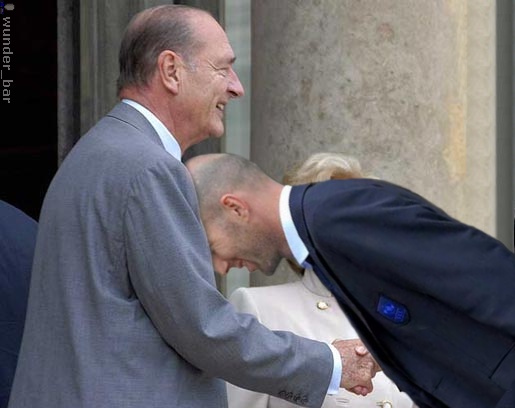no one, except maybe the protagonists themselves (though memory can be deceitful), knows for sure what materazzi said to induce zidane to butt him in the chest during the final of the world cup. lip readers and zidane himself say that materazzi called zidane’s mother and possibly his sister bad names. anti-racism website proclaim confidently that he accused zidane’s poor mother of being a terrorist, even as materazzi proudly proclaims not to know what an islamic terrorist is (since italian soccer players don’t have a reputation for culture and sophisication, i’m inclined to believe him). in an interview released yesterday or the day before (depending on what time zone you live), zidane said that “as a man” he could not leave his mother’s (and sister’s) honor unprotected and unavenged.
no matter. there are important issues at stake here. the most important one seems to me whether verbal and physical violence are ever commensurable. is there anything one can say to another that warrants and justifies physical assault? i tend to think not. but the journalistic climate is moving more and more in the other direction, with more attention being paid to materazzi’s insult than to zidane’s reaction. this seems to me to echo the debate over the danish cartoons, though in that case the public’s rage went in the opposite direction.
so i ask: how do words ever relate to actions? and how do words relate to action when racism, an inflamed political climate, and geopolitical unbalance are part of the equation? discuss.

apparently, zidane suffers from back seizures that force him to double up in pain and give the apperance of a head butt.

That’s a really great picture
I am also quite surprised that the press has been so quick to justify Zidane’s actions by claiming that a racist epithet or accusation of being a terrorist is grounds for a headbutt.
That said, “sticks and stones may break my bones but words can never hurt me” strikes me as a little naive. For the sake of argument, why exactly is speech considered less damaging, and more privileged, than physical assault? Is it because speech is always less damaging, or because of the slippery slope that regulating speech would create? Do we recognise that some speech should not be protected, but we just can’t think of a way of drawing a line between types of speech? This goes back to speech codes on campus, which is perhaps a dead issue, but was never adequately resolved in my mind.
i just watched this ecuadorian film cronicas (which i liked) and i noticed that every time someone said “puta tu madre” (which was frequently) the subtitles would translate it as “son of a bitch.” bizarre as it sounds, i never made the connection between “figlio di puttana” (italian) and son of a bitch (english). if this is what m. said to z., it really is a routine insult.
but i realize this is not the point i myself have raised. what campus speech codes are you talking about, chris? the unwritten laws of political correctness or something more precise and formal?
Gio, in the early and mid-1990s, some college campuses toyed with the idea of banning certain speech deemed racist, homophobic, etc. Students or faculty who violated such codes would be subject to college disciplinary action. I suppose you could say it was a by-product of political correctness. The Right-wing went to town about these proposed codes. I am not sure if any actually went into effect.
thanks, chris.
You know, my mother actually is a terrorist whore, and frankly it’s tiring. Always with the handjobs and the “death-to-the-infidels!” Sheesh. I feel for Zidane.
I kind of liked Cronicas, my response to which is buried in a catch-all post from a while back.